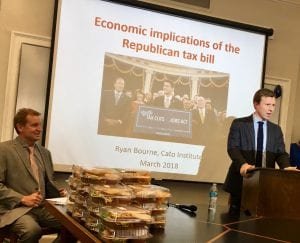
President Donald Trump signed the Republican tax bill, the Tax Cuts and Jobs Act, into law in December. It was the greatest one-time reduction in the corporate tax rate, from 35 percent to 21 percent, in U.S. history.
Cato Institute’s Ryan Bourne visited the SMU Tower Center to discuss the economic implications of the bill. Bourne examined the impact through three inter-linked lenses: the direct financial impact on families, the impact on economic efficiency and growth, and the impact on the federal debt burden.
Direct Financial Impact on Families
The Tax Policy Center estimated that 80 percent of households will see a tax cut as a result of the bill, while 5 percent will see a tax increase. Bourne said the discrepancy between the Democratic and Republican rhetoric of the bill was based off of differing timelines. The Democrats, who largely said the bill was a tax-break for the rich, were looking at the immediate effects of the bill in the 2018-2019 time range, Bourne said. The Republicans were looking farther down the line when discussing the bill’s impact. They focused on the 2025 and beyond long-range economic impacts, which are significantly different from the bill’s short term effects since many of the tax cuts are set to expire around that time.
Bourne made a case for trickle-down economics, explaining that the theory behind the bill is that it will improve incentives for productivity. Businesses that were wary of taking on new projects will now feel emboldened to do so with a lighter tax burden. In turn, new projects mean new employees, more engaged current employees, and hopefully an eventual raise in wages.
Impact on economic efficiency and growth
Bourne says the early signs are looking good. The bill is expected to have a marginal positive effect on the GDP’s projected 10-year growth. Ten-year bond yields are up, as is investment in equipment and structures, both of which point to a modest, positive GDP impact from the bill. Bourne argues that while the wide announcement of bonuses and share buybacks are also positive, the measurements that really matter are investment and wages. It’s too soon to know the bill’s impact on those.
Impact on the federal debt burden
The federal debt burden lens most concerns Bourne. Without pairing the tax cuts with more conservative spending policies, the national debt will continue to climb at a frightening rate. The current spending bill and budget will exacerbate the debt when paired with the loss of revenue from the Tax Cuts and Jobs Act. Bourne urges the Republican Party to practice fiscal restraint to prevent that from happening.